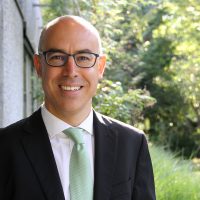Episode 90: A Fragmenting Global Economic System?

Gabriel Felbermayr
Austrian Institute of Economic Research
Gabriel Felbermayr has been Director of the Austrian Institute of Economic Research (WIFO) in Vienna and university professor at the Vienna University of Economics and Business (WU) since October 1, 2021. After studying Economics and Trade at the University of Linz, he went to Florence, Italy, to pursue his doctoral studies. From 2004 to 2005, he was an Associate Consultant with McKinsey & Co. in Vienna. From 2005 to 2008, he was Assistant Professor at the University of Tübingen. From 2009 to 2010, he held a chair in International Economics at the University of Hohenheim (Stuttgart). From 2010 to 2019, he led the ifo Center for International Economics at the University of Munich, where he also served as a full professor in International Economics. From 2019 until September 2021, he was President of the Kiel Institute for the World Economy and held a chair in Economics and Economic Policy at Kiel University (CAU). Gabriel Felbermayr holds various roles and positions, including Member of the Scientific Advisory Board of the German Federal Ministry of Economics and Energy, Chairman of the Statistics Council of the Statistics Austria Federal Institute, and Associate Editor of the European Economic Review. His research and consulting work focuses on issues of international trade theory and policy, labor markets, European economic integration, and current economic policy issues.

Jeff Rathke
President of AGI
Jeffrey Rathke is the President of the American-German Institute in Washington, DC.
Prior to joining AGI, Jeff was a senior fellow and deputy director of the Europe Program at CSIS, where his work focused on transatlantic relations and U.S. security and defense policy. Jeff joined CSIS in 2015 from the State Department, after a 24-year career as a Foreign Service Officer, dedicated primarily to U.S. relations with Europe. He was director of the State Department Press Office from 2014 to 2015, briefing the State Department press corps and managing the Department's engagement with U.S. print and electronic media. Jeff led the political section of the U.S. Embassy in Kuala Lumpur from 2011 to 2014. Prior to that, he was deputy chief of staff to the NATO Secretary General in Brussels. He also served in Berlin as minister-counselor for political affairs (2006–2009), his second tour of duty in Germany. His Washington assignments have included deputy director of the Office of European Security and Political Affairs and duty officer in the White House Situation Room and State Department Operations Center.
Mr. Rathke was a Weinberg Fellow at Princeton University (2003–2004), winning the Master’s in Public Policy Prize. He also served at U.S. Embassies in Dublin, Moscow, and Riga, which he helped open after the collapse of the Soviet Union. Mr. Rathke has been awarded national honors by Estonia, Latvia, and Lithuania, as well as several State Department awards. He holds an MPP degree from Princeton University and BA and BS degrees from Cornell University. He speaks German, Russian, and Latvian.
__

Peter S. Rashish
Vice President; Director, Geoeconomics Program
Peter S. Rashish, who counts over 30 years of experience counseling corporations, think tanks, foundations, and international organizations on transatlantic trade and economic strategy, is Vice President and Director of the Geoeconomics Program at AICGS. He also writes The Wider Atlantic blog.
Mr. Rashish has served as Vice President for Europe and Eurasia at the U.S. Chamber of Commerce, where he spearheaded the Chamber’s advocacy ahead of the launch of the Transatlantic Trade and Investment Partnership. Previously, Mr. Rashish was a Senior Advisor for Europe at McLarty Associates, Executive Vice President of the European Institute, and a staff member and consultant at the International Energy Agency, the World Bank, UN Trade and Development, the Atlantic Council, the Bertelsmann Foundation, and the German Marshall Fund.
Mr. Rashish has testified before the House Financial Services Subcommittee on International Monetary Policy and Trade and the House Foreign Affairs Subcommittee on Europe and Eurasia and has advised three U.S. presidential campaigns. He has been a featured speaker at the Munich Security Conference, the Aspen Ideas Festival, and the European Forum Alpbach and is a member of the Board of Directors of the Jean Monnet Institute in Paris and a Senior Advisor to the European Policy Centre in Brussels. His commentaries have been published in The New York Times, the Financial Times, The Wall Street Journal, Foreign Policy, and The National Interest, and he has appeared on PBS, CNBC, CNN, NPR, and the BBC.
He earned a BA from Harvard College and an MPhil in international relations from Oxford University. He speaks French, German, Italian, and Spanish.
The multilateral economic order is in crisis. The WTO no longer has the final word on trade issues, the IMF and World bank have lost market share as lenders, and countries are becoming more protectionist. Are smaller groups of countries, such as the G7, G20, or BRICS, the solution to the fracture? Can the WTO be reformed to avoid this fracture and also help countries address critical challenges such as climate change? How can the United States and Europe work together to build a sustainable and fair global trading system? Gabriel Felbermayr, Director of the Austrian Institute of Economic Research (WIFO), joins The Zeitgeist to discuss the transatlantic challenges of derisking, deindustrialization, and greening their economies.
Articles mentioned in this episode:
Wolfgang Reitzle: The Illusion of Effortless Prosperity
Steve Szabo: The Return of German Pessimism
Holger Schmieding: The German Puzzle
Host
Jeff Rathke, President, AGI
Guests
Gabriel Felbermayr, Director, Austrian Institute of Economic Research
Peter Rashish, Vice President and Director, Geoeconomics Program, AGI





